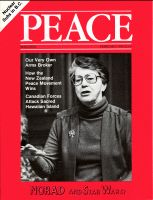
Peace Magazine Feb-Mar 1986, page 22. Some rights reserved.
Search for other articles by Andrew Van Velzen here
ANDREW VAN VELZEN
TORONTO--On February 6 an appeal will be launched for Toronto peace activist Scott Marsden, the success of which could have serious ramifications for the peace movement and other groups involved in activism.
Last June, Marsden was convicted of mischief after a civil disobedience protest at the Litton Systems facility in Rexdale, Ontario. (Litton makes the guidance system for the U.S. cruise missile.) When Provincial Judge Robert Dnieper handed down his decision, he said that Marsden was imposing his will on other citizens, and that his opinions were not worth any more than anyone else's.
Marsden, who had received convictions for previous actions at Litton, was sentenced to two weekends in jail, 200 hours of community service, two years probation, and a ban on any further attending demonstrations for one year--including a probition against going within one kilometer of Litton.
Many feel this sentence was unduly harsh, particularly the ban on attending demonstrations. Andrew King, Marsden's lawyer, feels it is an important civil liberties issue that could affect future political activities. Being banned from participating in subsequent demonstrations, says King, is a violation of one's rights. For this reason, the Canadian Civil Liberties Association is interested in the case and may be involved in the appeal.
Despite the importance of the issue, the peace movement has shown little interest. This surprises Marsden, who says, "This is similar to the way people have been banned in the Soviet Union and South Africa. Those of us fighting for social change must take seriously something that takes away anyone's basic civil liberties."
Marsden's friends are con cerned because of the difficulty of raising the money for the appeal. They ask those who can help to send cheques payable to Andrew King, c/o Karten, Barhydt, and King, 149 Gerrard Street East, Toronto M5A 2E4. The envelope should note "for Scott Marsden in trust."
UNITED NATIONS--On December 12, the General Assembly of the United Nations passed a resolution favoring a new approach to the creation of a Comprehensive Test Ban Treaty. The Partial Test Ban Treaty of 1963 includes a provision for reconvening the group of signatories for the purpose of amending the Treaty to make it comprehensive. As reported in the September, 1985 issue of Peace Magazine, diplomats have been discussing this possibility privately for over a year. It is regarded by some diplomats as the most favorable outcome of this year's General Assembly and the most promising disarmament development of the decade. The idea was put forward (by Mexico, Peru, Indonesia, Yugoslavia, and Sri Lanka) and received overwhelming support: 121 votes in favor, 3 against, and 24 abstentions. The three countries opposing the motion were the United States, Britain, and France. The Soviet Union voted for it, and Canada was among the nations abstaining.
The resolution recommended that the parties to the Partial Test Ban carry out "urgent consultations among themselves as to the advisability and most appropriate method to take advantage of the amendment procedure in the treaty for the conversion of the Partial Nuclear Test Ban Treaty into a comprehensive nuclear test ban treaty."
According to its terms, if one-third of the parties call for an amending conference, the three depositary governments (the United States, the Soviet Union, and Britain) shall convene it. The amendment would then have to be adopted by a majority of the signatories to the treaty and must be approved by all the depositary countries. In effect, then, the United States and Britain can then prevent the amendment from taking effect, but only by demonstrating vividly that their policies violate the wishes of virtually the entire community of nations.
It is expected that meetings to bring about such an amending conference will be taking place early in this new year. The organization that has done most to promote the idea is Parliamentarians for World Order. Their office can be reached in New York at 212/687-7755.
Plans are underway all across North America for special observances of "The International Year of Peace." In Toronto, Aldermen Jack Layton and Dale Martin have proposed a Peace Action Plan, which involves setting up a Peace Task Force on City Council, hiring a Peace Advocate, and providing a budget for events and public education.
The United Church has established a Peacemaking Fund, to which congregations may apply for matching grants. As well as supporting local peace initiatives, the church plans to address the issues of civil disobedience and tax reduction for peace.

Peace Magazine Feb-Mar 1986, page 22. Some rights reserved.
Search for other articles by Andrew Van Velzen here